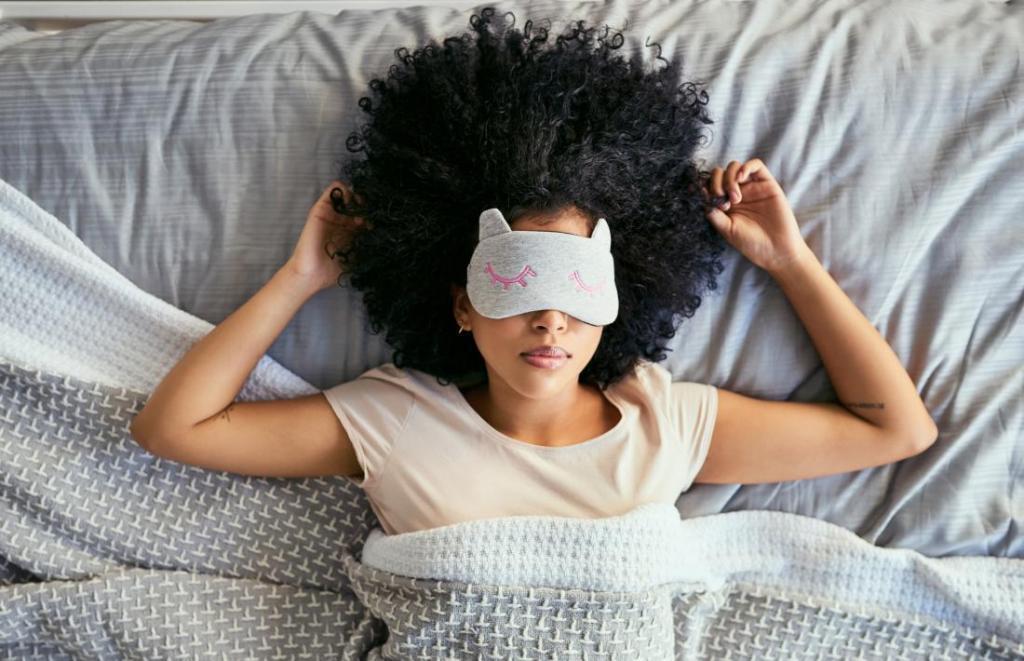People have dreams and REM sleep as part of a regular sleep cycle. Most of us forget our dreams and go about our daily lives without a clue as to what happened during our REM sleep cycles. However, for other people, the substance of their dreams is so lifelike that they remember it the following day. Vivid dreams are the term for these types of dreams.
What Are Vivid Dreams?
Vivid dreams are those that stay with you long after you wake up and feel like real-world memories. In a good night’s sleep, the brain goes through normal REM cycles. A vivid dream might be so powerful that it has a negative impact on your mental health and well-being, which is unusual for most dreams.

When Do Vivid Dreams Occur?
During REM sleep, which occurs around every 90 minutes and lasts approximately 20 to 25 minutes at a time, the majority of dreams occur. Vivid dreams might occur both during naps and during night, depending on your sleep cycle.
8 Causes of Vivid Dreams
A person may experience vivid dreams for a variety of causes, depending on their personal circumstances.
Dreams are frequently plagued by intrusions from the day’s thoughts. When they’re in rapid eye movement (REM) sleep, they tend to have the most vivid dreams.
Vibrant dreams can be brought on by a variety of factors, including:
Sleep deprivation
Having a lack of sleep can cause you to have more vivid dreams.
Alcohol
The rapid eye movement (REM) sleep stage of the sleep cycle can be inhibited by alcohol use. Stopping drinking might trigger dreams that are exceptionally vivid and powerful.
Substance use
The use of drugs like marijuana, cocaine, and ketamine, for example, might result in either good or awful dreams.
Recovering addicts may experience intense dreams concerning the drug they are trying to stop using.
This is a fairly regular occurrence. Experts believe that these dreams are a result of the brain damage caused by drug use.
Drug side effects
The side effects of all medications are possible. Bad or vivid dreams are among the possible adverse effects for some people.

Examples of drugs that may cause nightmares and vivid dreams include:
- include tricyclic monoamine oxidase inhibitors and serotonin reuptake inhibitors, antidepressants.”
- Beta-blockers, rauwolfia alkaloids, and alpha agonists are examples of centrally acting antihypertensives.
- levodopa (Larodopa) and selegiline are two common Parkinson’s disease treatments (Eldepryl).
The probable adverse effects of any medication will be indicated on the label.
Stress
Dreams can be triggered by stressful or painful circumstances. Researchers believe this is because of the significance that dreaming plays in memory and emotion processing.
In persons who suffer from post-traumatic stress disorder (PTSD), terrible nightmares are more common.
Pregnancy
Pregnant women are more likely to have vivid dreams and terrifying nightmares. Preparation for childbirth and parenting can be stressful at times. Hormonal swings can also be a factor.
Ill mental health
Dreams can be vivid for those who suffer from depression. Themes of low self-esteem are common. Panic attacks may occur as a result of these recurring dreams.
Dreams can be more vivid for those who suffer from schizophrenia or a dissociative disorder.
People who suffer from anxiety may also have more vivid nightmares. Running late or feeling embarrassed are examples of things that might cause a lot of anxiety or panic.
Narcolepsy
It is common for narcoleptics to report having vivid dreams. Unusual or unpleasant information from a reputable source.
When it comes to narcolepsy, there is a blurred border between sleep and waking up. People with the illness are frequently exhausted and tired during the day.
Cataplexy, a rapid loss of muscle control, is one of the most common symptoms of this condition.
A person with narcolepsy usually enters REM sleep within a few minutes after falling asleep. Even a short nap can cause them to have vivid dreams, causing them to wake up in the middle of the night.
Those who suffer from narcolepsy may also have lucid dreams. At some point, the person awakens from their dream and realizes that they are in charge of the situation.
Are Vivid Dreams a Cause of Concern?
The majority of the time, vivid dreams are nothing to be alarmed about. It is possible that dreams are an integral aspect of emotional processing and the creation of memories, even though researchers do not yet fully grasp the function or meaning of them.
There are several types of nightmares, but the most common are those that are terrifying or unnerving. There are many people who encounter occasional nightmares that resolve on their own. In contrast, nightmare disorder is a type of sleep disturbance in which nightmares disrupt sleep. If you’re having trouble sleeping because of recurring nightmares, it’s time to see a doctor.

What are the side effects of vivid dreams?
Vivid dreams are usually nothing to be concerned about. There are situations when they may only affect you for a short period of time.
Although negative vivid dreams can be emotionally distressing and disruptive to your sleep, especially if they linger for weeks or months, they are not necessarily harmful. And that can cause health problems.
Vivid dreams can cause a variety of adverse effects, including:
- drowsiness throughout the daytime hours. Your ability to concentrate and retain information at school or job may suffer as a result. Everyday activities like driving or taking a shower can be made more difficult. If you are distracted, even the tiniest of activities might turn disastrous.
- Mood issues. Emotionally taxing dreams might lead to melancholy or anxiety. If your vivid dreams persist over time, this can be a particularly troubling issue.
- Refusing to go to bed. If you’re afraid of having another horrible dream, you might find yourself avoiding going to bed or falling asleep.
- Suicidal thoughts or efforts. Suicidal ideas (ideation) have been linked to disturbing dreams for a small percentage of the population. This is a really severe matter. If you’ve attempted suicide or are thinking about it, call a crisis or suicide prevention hotline for assistance right away. At 800-273-8255, call the National Suicide Prevention Lifeline. It’s critical that you seek assistance as soon as possible.
How to Promote Vivid Dreams
- Keep a notebook of your dreams: You may be better able to remember your dreams if you jot them down as soon as you wake up.
- Avoiding alcohol can lead to more vivid dreams because alcohol reduces REM sleep.
4 Ways to Prevent Unpleasant Vivid Dreams
The intense and frightening nature of some vivid dreams contrasts sharply with the pleasant aspects of others. Some methods exist for reducing the severity of disturbing nightmares.
- Be more mindful of your sleep habits. Maintaining good sleep hygiene includes paying attention to your internal circadian clock and adopting sleep-inducing activities. It is possible to lower the likelihood of vivid dreams by following a regular sleep pattern, going to bed at the same time every night, and making sure your room is dark and silent.
- Develop coping skills for dealing with anxiety and other forms of stress. A pattern of vivid dreams might develop as a result of ongoing stress and anxiety. Maintaining a healthy work-life balance, exercising regularly, and finding a supportive group can all help alleviate stress and anxiety. If these measures fail, consider considering counselling.
- Make an appointment with a medical professional. If you see an increase in the number of vivid dreams you have, keep a sleep diary and contact your doctor to explore treatment options. If you have frequent and disturbing nightmares, your doctor might probably offer some kind of therapy to help you cope with them. For those with narcolepsy or insomnia, this is especially relevant because the vivid dreams may be a secondary indication of a greater sleep issue.
- Seek the assistance of a mental health professional. Treatments such as imagery rehearsal therapy and other approaches aimed at lessening the impact of vivid dreams may be available from a trauma therapist.
Melatonin Supplements and Vivid Dreams
The hormone melatonin, which helps regulate the sleep-wake cycle, is created by the body on its own. Melatonin pills and dreams: the evidence is mixed. It’s been demonstrated to lessen the intensity of some people’s vivid dreams when used to treat insomnia. People with REM sleep behavior disorder were found to benefit from melatonin supplementation, which reduced frightening nightmares and other symptoms.
In some cases, melatonin may improve REM sleep, which can lead to more vivid dreams, as a result. Melatonin’s long-term effects are unclear, so be careful to see a doctor before using it.
Want to Learn More About Catching Those Elusive Zs?
Dr. Matthew Walker, author of Why We Sleep and the founder-director of the Center for Human Sleep Science at UC Berkeley, has created a MasterClass Annual Membership that includes exclusive instructional videos from him. There are numerous ways to improve your sleep, but Matthew’s advice and information on uncovering your body’s natural cycles will help you have a better night of rest.

![Top Rated CPAP Machine Buyer’s Guide [current_date format=’m/Y’]](https://bestpillowsleepers.com/wp-content/uploads/2023/03/best-cpap-machine-img_6405d72310053-400x300.jpg)
![The 11 Best Cooling Weighted Blankets [current_date format=’m/Y’]](https://bestpillowsleepers.com/wp-content/uploads/2023/01/best-cooling-weighted-blankets-img_63d4ff15c615d-400x300.jpg)
![Ultimate Guide to Choosing a Best Cooling Mattress Pads [current_date format=’m/Y’]](https://bestpillowsleepers.com/wp-content/uploads/2023/01/best-cooling-mattress-pads-img_63c403115126b-400x300.jpg)
![Ultimate Guide to Choosing a Best Cooling Mattress [current_date format=’m/Y’]](https://bestpillowsleepers.com/wp-content/uploads/2023/01/ultimate-guide-to-choosing-a-best-cooling-mattress-img_63bcdba870d77-400x300.jpg)
![Ultimate Guide to Choosing a Best Cooling Comforters [current_date format=’m/Y’]](https://bestpillowsleepers.com/wp-content/uploads/2023/01/ultimate-guide-to-choosing-a-best-cooling-comforters-img_63bba2f5cd3ce-400x300.jpg)